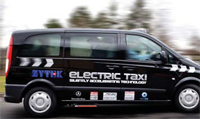|
A prototype
electric version of the Mercedes Vito taxi has been
designed and built in just six months by a consortium of British
technology companies. Part-funded by the Government’s
Advantage Niche Vehicle Research & Development Programme,
the prototype vehicle meets PCO requirements and can carry up to
six people around 120 kilometres on a single six hour charge. The E-Vito uses a new 70kW version of Zytek’s proven electric drivetrain and a custom-designed Vocis gearbox built by Graziano. To maximise interior space, the vehicle has been converted to front wheel drive to allow the 35kWh Valence Li-Ion battery pack to be installed beneath the vehicle floor. By lowering the centre of gravity, the low mounting point also improves vehicle stability and ride quality. A steerable rear axle provides the 25ft turning circle. The Vito electric drive uses existing engine mounting points with minor revisions and requires just three additional connections (water, high voltage electrics and low voltage electrics). It interfaces with all existing vehicle systems |
The electric cab race is on! |
|
 including ABS (Antilock Braking System), ESP (Electronic Stability Programme) and OBD (onboard diagnostics). Performance at city speeds is said to be "lively". Zytek Automotive sales and marketing director Steve Tremble told Call Sign that all the technologies are market-ready and thoroughly proven in vehicles already in production. "We could easily have electric taxis in service in-time for the 2012 London Olympics," he says. The partners in the programme are Zytek, Valence Technology, Penso and Mercedes-Benz UK, which donated the base vehicle. In the meantime, Manganese Bronze, parent company of the London Taxi Company, are working with electric vehicle maker Tanfield to make battery-powered taxis that were said to be ready to go into production before the end of the year. The TX4E is said to have a top speed of |
50mph, making it more
desirable for in-town working rather than on the motorway.
It is expected to be
able to run for at least 100 miles (160 kilometres) on one
charge of its innovative iron
phosphate lithium-ion battery pack, but can
also be topped up midway and has a 25% fast charge in one hour. Both the Vito and TX4 electric versions would cost substantially more than ordinary taxis, but would be much cheaper to run at less than 4p a mile – well under half of the diesel versions. Both would escape the "showroom tax" that began on April 1 and would benefit greatly from reduced road tax. In the meantime, Kit Malthouse, Deputy to Boris Johnson, has spoken of London’s plans to construct a "hydrogen highway" – a network of filling stations to provide fuel for hydrogen vehicles that are planned to be in service prior to the 2012 London Olympics. These include 50 LTC taxis, 50 cars/vans (for police and fire brigade) and 8 buses. Regardless of whether it’s electric or hydrogen, it does look as though diesel is on the way out... |
|
|
|
Powered by NetXPosure |
| Copyright 1997-2010 Dial-A-Cab Ltd, All rights reserved. |